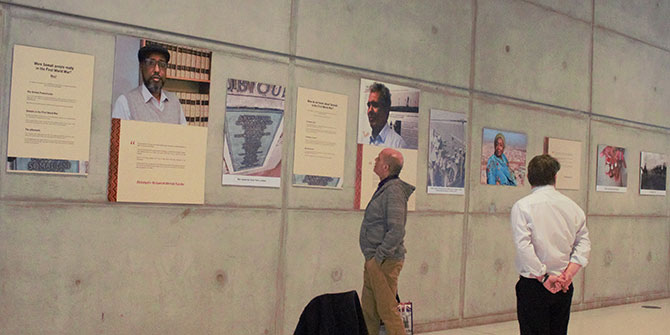LSE’s Maddalena Procopio concludes our series celebrating Kenya’s 50th anniversary of independence by examining how the country’s popularity means she can pick and choose with whom she does business.
Fifty years after independence from British rule, Kenya’s relations with external actors still play a key role not only in the country’s foreign policy, but also in the domestic arena.
Kenya’s 50th anniversary celebrations of independence come at a difficult time for the country’s domestic as well as foreign affairs. It has been an eventful year for the East African country. Early on, the general elections were the subject of much local and global attention accompanied by fears that ethnic violence would erupt as in the aftermath of the 2007 elections. The terrorist attack on the Westgate shopping mall shook the country in September not only with images of terrified hostages and dead bodies, but also with the repugnant looting by rescue forces. And the ICC cases against President Uhuru Kenyatta and Deputy President William Ruto hang as a sword of Damocles over leaders and citizens alike.

In spite of these current challenges, Kenya has come a long way and has achieved not only independence from external domination, but also independence from internal one-party rule. With a new constitution, an expanding middle class, and a developing technology and business hub, the country thrives on creativity, a sense of ownership and an insatiable search for new opportunities. A second generation of leaders now holds the reins of power, no longer part of the generation who fought for independence and a mere step away from the emerging digital generation.
It seems likely that more testing times lie ahead in Kenya’s democratic journey as the recent disputes over the Media Bill demonstrate, with Parliament passing a law prescribed by President Kenyatta, an unconstitutional act. Civil society was also under threat, with the government threatening to cap foreign funding for NGOs, although that bill has now been blocked by MPs after street protests against it.
In addition to the resilience of the Kenyan people, the country’s geostrategic position has always made it “an inevitable participant – willing or otherwise – in major global events”[1]. As new geopolitical dynamics unfold on the world stage, with the rise of the BRICS, and the perception of China towering above all, Kenya has acquired an increasing number of partners in business, development, and politics. More options mean more choice, especially in light of the different political and economic paradigms introduced by emerging powers, characterised by a strong focus on political non-interference and trade relations. The darling of the West now has new suitors.
The election of Uhuru Kenyatta, seen as disadvantageous from the West, has raised the issue of Kenya’s pivotal role between the West and China. A recurrent theme – especially in the past few months, after the elections and with the ongoing ICC trial – has been President Kenyatta’s look East strategy. Mr Fraser, former United States Assistant Secretary of State for African Affairs commented that “the geo-strategic environment has changed entirely and particularly (in favour of) China. The Chinese have changed the playing field (and) if the US, the UK and Europeans don’t want to deal with Uhuru Kenyatta, he has another option”[2].
Although at leadership level, the relationship with China represents a business strategy, a political strategy, and seems to satisfy a personal need, there are no restrictions with whom the country will do business. Indeed when Kenya-China relations trickle down to society, there is a high level of awareness and ability to evaluate and select the most suitable partner. Far from playing an either-or game, it is important to acknowledge that Kenya’s reactions and mechanisms put in place to further the country’s interests are not static or monolithic. It is indeed inappropriate to simply assume that the state and society sympathise with whoever gives more requesting less. While it is true that China wants to pursue policies that are in her best interests, as all states tend to do, this does not necessarily mean that Kenyans, from state to society, accept them without question. The country has a very diversified and internationalised environment and a variety of partners tends to dominate a number of sectors without an overwhelming monopoly of one over the others.
Mutunga argues that “history records that it has been the culture of Kenyans to resist domination, oppression and exploitation”[3]. Now more than ever before, Kenya’s domestic context as well as the position the country occupies on the international stage, show how a tradition of extraversion[4] has been re-adapted to suit the needs of an ever more aware population endowed with a hard won – at times still fragile – right to choose.
Maddalena Procopio is a PhD student in LSE’s Department of International Relations.
[1] Uhuru Kenyatta, What we see when we look East. Available at: http://www.safpi.org/news/article/2013/uhuru-kenyatta-what-we-see-when-we-look-east
[2] J. Kamau, ‘China Threat Forces UK Rethink of Kenya Policy’, Business Daily Africa. Available at: http://www.businessdailyafrica.com/China-threat-forces-UK-rethink-of-Kenya-policy/-/539546/1726968/-/81mmbl/-/index.html
[3] W. Mutunga, Constitution-Making from the Middle. Civil Society and Transition Politics in Kenya, 1992-1997, SAREAT&MWENGO, Nairobi, 1999, p.1
[4] J.F. Bayart, ‘Africa in the World: A History of Extraversion’, African Affairs, 99, 2000, p.222





